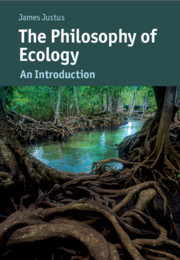Book contents
- The Philosophy of Ecology
- Cambridge Introductions to Philosophy and Biology
- The Philosophy of Ecology
- Copyright page
- Contents
- Figures
- Preface
- Introduction
- 1 The Ecological Niche
- 2 Distinctively Ecological Laws and the Reality of Biological Communities
- 3 The Balance of Nature
- 4 Modeling in Ecology
- 5 Biodiversity
- 6 Progress in Applied Ecology
- 7 Fact and Value in Applied Ecology
- References
- Index
1 - The Ecological Niche
Published online by Cambridge University Press: 28 May 2021
- The Philosophy of Ecology
- Cambridge Introductions to Philosophy and Biology
- The Philosophy of Ecology
- Copyright page
- Contents
- Figures
- Preface
- Introduction
- 1 The Ecological Niche
- 2 Distinctively Ecological Laws and the Reality of Biological Communities
- 3 The Balance of Nature
- 4 Modeling in Ecology
- 5 Biodiversity
- 6 Progress in Applied Ecology
- 7 Fact and Value in Applied Ecology
- References
- Index
Summary
At least until Hubbell’s neutral theory emerged, no concept was thought more important to ecological theorizing than the niche. Without it – and its highly abstract definition by Hutchinson in particular – technically sophisticated and well-regarded theories of character displacement, community assembly, limiting similarity, and many others would seemingly never have been developed. To cite just one example among many, grasslands in the central plains of North America and Africa share a similar structure and exhibit similar dynamics because they are claimed to instantiate roughly the same system of niches, albeit with different species. The niche concept is also the centerpiece of perhaps the best candidate for a distinctively ecological law, the competitive exclusion principle. But the incongruous array of proposed definitions of the concept squares poorly with its apparent scientific centrality. I argue this definitional diversity reflects a problematic conceptual imprecision that challenges its putative indispensability in ecological theory. Recent attempts to integrate these disparate definitions into a unified characterization fail to resolve the imprecision. The niche is not the conceptual cornerstone of ecological science.
Keywords
- Type
- Chapter
- Information
- The Philosophy of EcologyAn Introduction, pp. 14 - 37Publisher: Cambridge University PressPrint publication year: 2021



